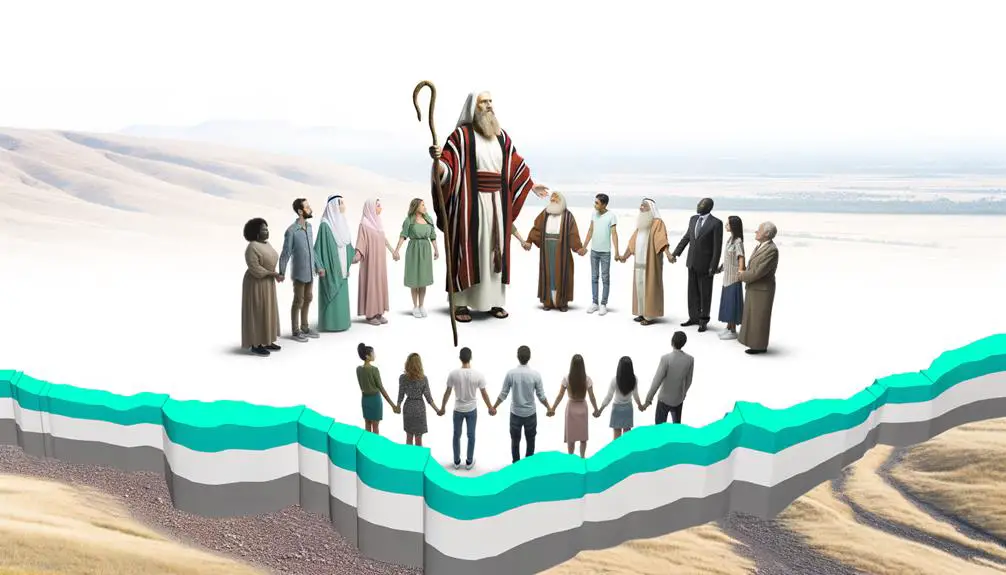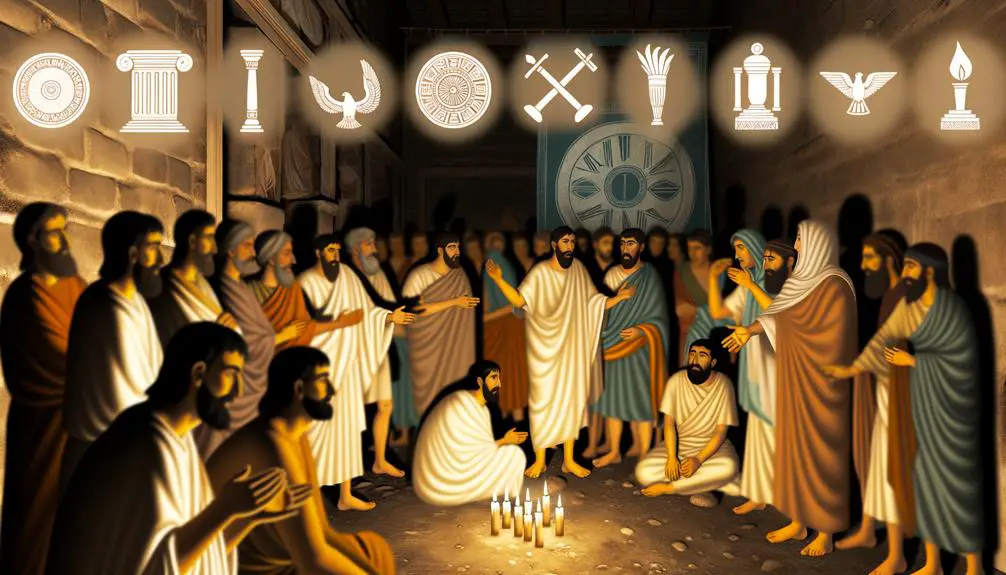Uncover how biblical tales blend national devotion with divine duty, inviting reflection on patriotism's profound, multifaceted essence.

Patriotism in the Bible
Patriotism often conjures images of flags and fervor, yet in the Bible, it unfolds in whispers of faith and acts of obedience. You're invited to explore how biblical narratives weave a complex tapestry of love for one's country, juxtaposed with an unwavering commitment to divine mandates.
From the Promised Land that shaped a national identity to Jesus' teachings on service that transcended borders, the scriptures offer nuanced perspectives on balancing God and country. As you ponder these ancient texts, consider how they might illuminate modern debates around patriotism, sparking a deeper understanding of its roots and ramifications.
Key Takeaways
- Biblical patriotism is deeply rooted in a sense of divine governance and covenant loyalty to God and community.
- The Promised Land and national identity in the Bible symbolize the importance of loyalty, law observance, and shared tradition for collective well-being.
- Prophets in the Bible played a crucial role in shaping national destiny by acting as divine intermediaries and calling for covenant renewal.
- Jesus' teachings emphasize the transformative power of selfless service, highlighting its significance for personal growth and societal cohesion.
Biblical Foundations of Patriotism

The concept of patriotism, as viewed through a biblical lens, finds its roots in the profound sense of belonging and duty that ancient texts ascribe to communities of faith. This foundation is deeply intertwined with the principles of divine governance and covenant loyalty, key elements that have shaped the understanding of collective identity and moral obligations within these communities. You'll find that the Bible doesn't explicitly use the modern term 'patriotism,' but the essence of this concept permeates its narratives, primarily through the relationships and responsibilities ordained by God to His people.
In exploring divine governance, you encounter a system where authority and guidance are divinely instituted. This governance isn't about the dominion of man over man, but rather about the sovereignty of God over creation, including human societies. It's this recognition of a higher authority that instills in communities a sense of purpose and direction, aligning their societal values with divine will. This alignment fosters a collective identity rooted in obedience and reverence to God, elements that are quintessential to the biblical depiction of patriotism.
Covenant loyalty further enriches this understanding by introducing a binding agreement between God and His people. This covenant isn't merely a contract; it's a sacred promise that entails mutual commitment and fidelity. You see, covenant loyalty demands more than adherence to laws; it calls for a heartfelt dedication to the community's welfare, grounded in the faithfulness to God's commandments. This loyalty transcends individual interests, compelling members to act in the best interest of their community, thus embodying the very essence of biblical patriotism.
Promised Land and National Identity

Building on the foundational aspects of divine governance and covenant loyalty, it's essential to explore how the concept of the Promised Land significantly shaped the national identity of the Israelites. The narrative of entering and inhabiting a land divinely decreed to a people not only solidified their collective identity but also underscored the covenant implications upon their societal values and behavior.
The Promised Land was more than a geographical location; it represented a tangible manifestation of the covenant between God and the Israelites. This physical space provided a context in which identity formation could occur, rooted in shared experiences and divine promise. Let's delve into three critical aspects:
- Covenant Implications: The land was a constant reminder of the covenant with God, intertwining religious faith with national identity. Observance of the law and loyalty to the covenant were integral to maintaining possession of the land, reinforcing the bond between divine promise and communal behavior.
- Identity Formation: Settling in the Promised Land necessitated the development of social, political, and religious structures that reflected their unique identity as God's chosen people. This process of identity formation was integral to their survival and prosperity as a nation.
- Collective Memory and Tradition: The narrative of the journey to and life in the Promised Land became a cornerstone of Israelite culture, influencing traditions, rituals, and moral codes. This shared history and its commemoration played a pivotal role in sustaining a cohesive national identity over generations.
Prophets and National Destiny

Within the biblical narrative, prophets played a crucial role in shaping the national destiny of the Israelites, acting as intermediaries between the divine and the people. These figures were entrusted with delivering divine warnings and advocating for covenant renewal, thereby influencing the nation's moral and spiritual direction. Their messages often centered on the consequences of the Israelites' actions, underscoring the importance of obedience to divine commands for the preservation of their national identity and destiny.
The prophets' calls for covenant renewal weren't merely ritualistic. They served as critical interventions at junctures where the nation's path could lead to prosperity or disaster. Through these calls, prophets reminded the Israelites of their unique relationship with the divine and the conditions attached to it. This relationship was foundational to their national identity and was meant to guide their actions both as individuals and as a community.
Divine warnings delivered through prophets were pivotal in steering the nation away from paths that would lead to downfall. These warnings often came at times of moral and spiritual decline, when the temptation to adopt foreign practices threatened to erode the core values and beliefs that defined the Israelites. By heeding these warnings, the nation could realign with its divine mission, ensuring its survival and prosperity.
Jesus' Teachings on Service

In analyzing Jesus' teachings on service, you encounter the foundational principles of serving others selflessly and loving your neighbors as yourself. These concepts not only underscore the moral framework within biblical narratives but also highlight a broader, more inclusive understanding of patriotism.
Serving Others Selflessly
Reflecting on Jesus' teachings, one finds that serving others selflessly sits at the core of his message, emphasizing the transformative power of acts of service devoid of personal gain. This principle not only enriches individual lives but also strengthens the fabric of communities. Here's how:
- Volunteerism Impact: Engaging in volunteer activities fosters a sense of belonging and significantly contributes to societal well-being.
- Community Engagement: Active participation in community service events cultivates networks of support and mutual care, reinforcing social cohesion.
- Personal Growth: Selfless service promotes personal development, humility, and empathy, essential traits for effective leadership and community building.
Analyzing these elements, it's clear that Jesus' advocacy for selfless service isn't just a moral directive but a foundational principle for nurturing resilient and compassionate communities.
Love Your Neighbors
Building on the foundation of selfless service, Jesus' command to love your neighbors as yourself deepens the understanding of service by embedding it within the framework of mutual respect and care. This directive isn't just about local communities; it extends to fostering global empathy and cultural understanding. In practice, this means looking beyond borders and recognizing the humanity in everyone.
Aspect |
Impact on Service |
Relation to Teachings |
|---|---|---|
Global Empathy |
Enhances compassion for international needs |
Encourages actions that transcend local boundaries |
Cultural Understanding |
Promotes acceptance and inclusivity |
Aligns with loving neighbors of diverse backgrounds |
Mutual Respect |
Strengthens community bonds |
Reflects the essence of seeing others as oneself |
Early Christians and Roman Empire

Early Christians navigated complex allegiances within the Roman Empire, often confronting challenges that tested their faith and societal roles. As followers of a new faith, they found themselves at odds with the prevailing Roman religious and social norms, leading to periods of significant Roman persecution. This persecution served to both challenge and spread the Christian faith, as believers were scattered across the empire, a phenomenon known as the Christian diaspora. This dispersal helped in the propagation of Christianity but also placed early Christians in a precarious position with regard to their patriotic duties to the Roman state and their spiritual obligations.
In understanding the early Christian experience under Roman rule, consider the following points:
- Roman Persecution: Christians faced intense scrutiny and punishment for their refusal to worship Roman gods, a refusal that was seen not just as religious dissent but as political rebellion. This persecution varied in intensity and form, influencing the development of early Christian identity and community cohesion.
- Christian Diaspora: The dispersal of Christians throughout the Roman Empire fostered the spread of Christianity into diverse cultural contexts. This diaspora was both a result of and a response to Roman persecution, facilitating the transformation of Christianity from a localized sect into a global religion.
- Cultural and Religious Syncretism: In their efforts to navigate the complex landscape of the Roman Empire, early Christians engaged in various degrees of cultural and religious syncretism. This blending of beliefs and practices helped Christianity to adapt and survive in a hostile environment, but also raised questions about the purity of the faith and the limits of accommodation.
Analyzing the early Christian experience within the Roman Empire reveals a nuanced interplay between faith, identity, and societal allegiance.
Balancing God and Country

Navigating the complex interplay between religious devotion and national loyalty presents a significant challenge for believers striving to honor both God and country. This delicate balance involves discerning when to prioritize divine loyalty over secular allegiance, and vice versa. The Bible, while offering guidance on living a life of faith, also touches upon the responsibilities believers have towards their nation. However, it doesn't provide a one-size-fits-all answer, leaving individuals to interpret and apply its teachings within the context of their own lives.
The concept of divine loyalty suggests an unwavering commitment to God's commandments and teachings, often requiring believers to stand firm in their faith even when societal or governmental pressures push towards compromise. On the other hand, secular allegiance involves fulfilling civic duties, obeying laws, and contributing to the welfare of the nation. The tension arises when these two allegiances appear to conflict, forcing believers to make tough decisions about where their ultimate loyalty lies.
Scripture offers examples of this balance, encouraging respect for governmental authorities while affirming that God's authority is supreme. For instance, Jesus' teaching to 'render to Caesar the things that are Caesar's, and to God the things that are God's' encapsulates the essence of balancing divine loyalty with secular allegiance. This principle suggests that while believers are to be good citizens, their allegiance to God transcends all earthly commitments.
Modern Implications of Biblical Patriotism

You must consider how the biblical roots of patriotism influence contemporary interpretations and applications of nationalism.
It's crucial to analyze the ways in which scripture is applied to modern nationalistic ideals, discerning both alignment and divergence.
This examination will shed light on the complexities of integrating biblical principles with contemporary patriotic expressions.
Biblical Roots of Patriotism
The Bible's narratives and teachings have significantly influenced the development of patriotism, framing it within a context of faithfulness and devotion to one's country. This influence manifests through:
- The concept of divine kingdoms: Biblical texts often depict nations under the direct sovereignty of God, suggesting a divine endorsement of patriotic principles.
- Covenant loyalty: The idea of a covenant between God and His people, akin to a social contract, reinforces the notion of allegiance to one's nation, as it mirrors the fidelity expected in the divine-human relationship.
- Prophetic calls for justice: Prophets in the Bible didn't just critique their societies; their calls for justice and righteousness within the nation emphasized a deep, patriotic concern for their country's moral and spiritual health.
Applying Scripture to Nationalism
Understanding how biblical concepts of patriotism have shaped historical perspectives leads us to examine their implications in contemporary nationalism. The integration of scripture with notions of national identity demands a nuanced understanding, especially when considering the ideas of global citizenship and cultural diversity.
Biblical teachings, advocating for love, justice, and unity, challenge modern interpretations of nationalism that may veer towards exclusivity or supremacy. In this context, applying scripture to nationalism doesn't mean fostering a narrow sense of patriotism but rather embracing a broader, more inclusive vision.
This perspective encourages individuals to see beyond national boundaries, recognizing the value of cultural diversity and the interconnectedness of global citizenship. Thus, biblical patriotism, when rightly understood, promotes a nationalism that's compassionate, inclusive, and respectful of the global community.
Frequently Asked Questions
How Does the Concept of Patriotism in the Bible Align With the Current Understandings of Global Citizenship and Multicultural Societies?
You're exploring how traditional notions of patriotism align with today's global citizenship and multicultural societies.
It's crucial to understand that concepts of global unity and cultural empathy are at the heart of this alignment.
Modern interpretations emphasize inclusivity and understanding across cultures, challenging the exclusivity sometimes associated with patriotism.
This perspective fosters a broader sense of belonging and responsibility beyond national borders, reflecting a shift towards more globally oriented values.
Can Biblical Patriotism Justify the Separation of Church and State in Contemporary Politics?
You're walking a tightrope when considering if biblical patriotism can justify separating church and state. This question hinges on maintaining religious neutrality within legal frameworks, a cornerstone of contemporary politics.
Analyzing this concept requires dissecting how religious sentiments, inspired by any text, align or conflict with the principles of secular governance. It's a balance act, ensuring that laws reflect a pluralistic society without favoring a single religious narrative.
In What Ways Does the Bible Address or Fail to Address the Concept of Patriotism in Countries Without a Monotheistic Tradition?
You're exploring how ancient allegiances and cultural relativism intersect with patriotism in non-monotheistic societies. The Bible doesn't directly address patriotism in these contexts, leaving a gap in understanding. This omission challenges you to critically analyze the broader implications of patriotism beyond religious frameworks.
How Do Non-Christian Faiths Interpret the Biblical Narratives That Are Often Associated With Patriotism, Especially in Multi-Religious Societies?
In exploring how non-Christian faiths perceive biblical narratives tied to patriotism, especially in diverse societies, it's crucial to note that over 80% of the world's population identifies with a religious group.
Through interfaith dialogue, these communities engage in cultural interpretations of shared stories, analyzing them beyond their original context.
This scholarly approach fosters a deeper understanding and respect among different beliefs, highlighting the universal themes that transcend singular religious perspectives.
Are There Any Biblical Teachings That Have Been Historically Misused or Misinterpreted to Fuel Nationalism or Xenophobia, and How Do Modern Theologians Address These Issues?
You're asking if biblical teachings have been twisted for nationalism or xenophobia. Historically, yes, some narratives have been misused.
Modern theologians dive deep into historical context to clarify these misinterpretations. Through theological reinterpretation, they aim to address and correct these issues, ensuring that the original, inclusive message of the texts is understood.
This approach helps disentangle faith from harmful ideologies, promoting a more universal understanding of biblical teachings.
Conclusion
In conclusion, the Bible weaves a complex tapestry of patriotism, from the Promised Land's role in national identity to Jesus' teachings on service.
While the prophets navigated the treacherous waters of national destiny, early Christians balanced their faith with Roman citizenship.
This biblical patriotism, though ancient, still echoes in today's debates on nationalism.
However, like trying to tweet from a stone tablet, translating these concepts to modern contexts requires careful thought and an understanding of their intrinsic values and limitations.



Sign up